The French bulldog was recently named the most popular dog breed in the United States. Their adorable appearance and their goofy personality have captured the hearts of dog lovers everywhere. Countless people have welcomed them into their families. With how popular the breed has become, there will likely be more people adopting one of these lovable pups. It’s important for potential owners to be aware of Frenchie’s unique characteristics. It’s also good to know what you can expect as they grow up! In this article, we dive into the details of the French bulldog‘s progression, ideal diet, and training tips! Let’s get started.
Brief French Bulldog Summary
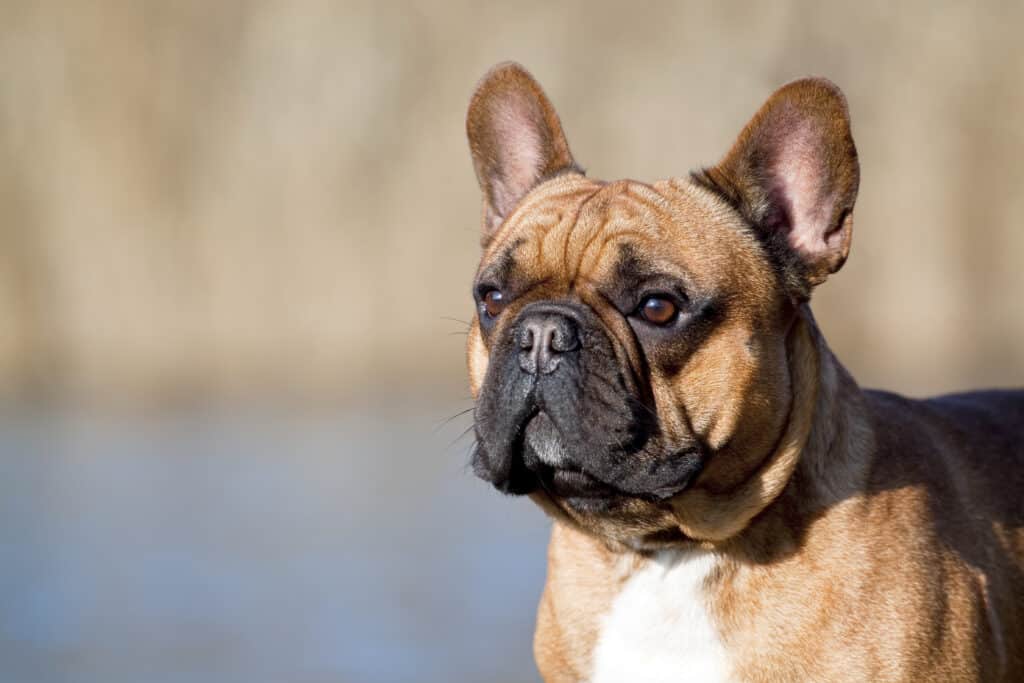
The adorable Frenchie was first created in the 18th century in England by breeding English bulldogs with smaller pups.
©Sbolotova/Shutterstock.com
While you may assume the French bulldog originated in France, this is actually not the case. The adorable Frenchie was first created in the 18th century in England. Brits bred English bulldogs with smaller pups, as they were looking for a lapdog version of the original bulldog. These smaller bulldogs soon become treasured members of the family. Many English workers took their dogs with them when they fled to France for more work opportunities.
Once the tiny bulldogs arrived in France, French dog lovers fell in love with the compact bulldog. This led to them being heavily bred for quite some time. This breeding eventually led to the French bulldog we know and love today. Though this adorable pup has been around for quite some time, their lovable personality has not changed. While their large ears and scrunched faces are the driving force in their popularity, their unique personality is what sets them apart from other canine friends.
French Bulldog Growth and Weight Chart by Age
The French bulldog is considered a small breed dog. You do not have to worry about them reaching impressive sizes. However, it’s always good to know what to expect in terms of growth throughout the first year of life! To help you better understand what’s ahead, let’s break it down month by month.
| Age | Male Weight | Female Weight |
|---|---|---|
| Birth | Under 1 pound | Under 1 pound |
| 1 Month | 4-7 pounds | 3-6 pounds |
| 6 Weeks | 7-9 pounds | 5-7 pounds |
| 2 Months | 9-12 pounds | 7-10 pounds |
| 3 Months | 10-14 pounds | 8-12 pounds |
| 4 Months | 12-16 pounds | 10-15 pounds |
| 5 Months | 15-20 pounds | 11-17 pounds |
| 6 Months | 17-22 pounds | 13-20 pounds |
| 7 Months | 18-25 pounds | 14-21 pounds |
| 8 Months | 19-27 pounds | 15-22 pounds |
| 9 Months | 20-28 pounds | 16-22 pounds |
| 10 Months | 20-28 pounds | 17-24 pounds |
| 11 Months | 20-29 pounds | 17-24 pounds |
| 12 Months | 20-29 pounds | 17-24 pounds |
| 2 Years | 20-29 pounds | 17-25 pounds |
The French bulldog can vary slightly in size when comparing male and females. The above weights are averages of what you can expect for your growing Frenchie pup. Just keep in mind that if you want the most accurate indication of how big your pup will be, then you should see their parents in person.
When Will My Frenchie Stop Growing?
As we mentioned above, the French bulldog is a small breed canine friend. They should not achieve any major growth throughout the first year of their life. And they will reach size maturity at a faster rate than large breed dogs. In most cases, you can expect your French bulldog puppy to stop growing at 10 months of age.
Your French bulldog should reach his adult height at 10 months of age. However, he may put on a bit of extra weight as the next year passes. This should only involve filling out slightly, and he will not have any additional growth spurts after the 10-month mark.
How Big Will My French Bulldog Be When It’s Fully Grown?
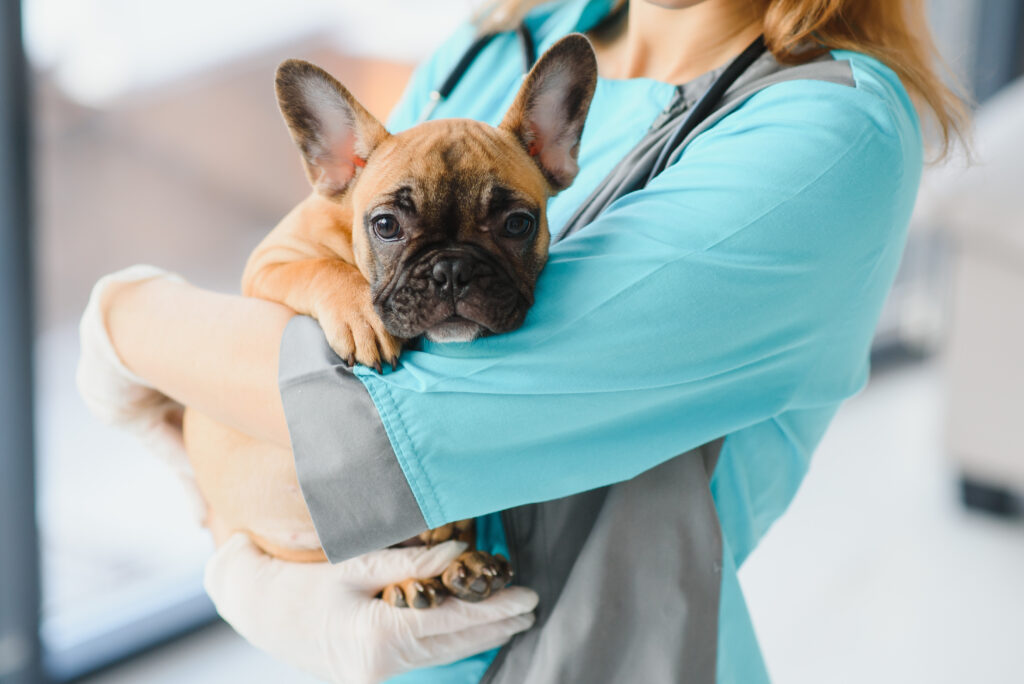
Every French bulldog can vary slightly based on their genetics, but most will weigh anywhere from 17-29 pounds when they are fully grown.
©Hryshchyshen Serhii/Shutterstock.com
Every French bulldog can vary slightly based on their genetics. But most French bulldogs will weigh anywhere from 17-29 pounds when fully grown. However, the most accurate way to estimate your Frenchie’s adult size is by seeing their parents in person.
Keep in mind that obesity is very common in French bulldogs due to their short stature. Some French bulldogs will weigh more than 29 pounds, but it may point to the Frenchie being slightly overweight. If you are ever concerned about your French bulldog’s weight, then we suggest having them assessed by your vet.
When Should My Pup Stop Eating Puppy Food?
If you have a Frenchie puppy in your life, then we always suggest feeding her puppy food until she reaches adult size. Puppy food contains essential nutrients that help a growing pup thrive. These range from higher levels of protein and calcium to extra calories needed to keep up with energy requirements. If your French bulldog does not eat a puppy diet, she could experience health complications down the line.
Since all French bulldogs should eat puppy food until adult size is reached, then this means a puppy diet until 10 months old. After 10 months of age, you can then transition over to an adult dog food created for small breed dogs.
When Will My Dog Start Losing Teeth?
Did you know that French bulldogs will experience a similar teething process to humans? While they may lose their baby teeth over a period of a few months rather than years, they still make room for permanent adult teeth.
In most French bulldog puppies, you will notice their puppy teeth beginning to erupt from their gums when they are around three weeks old. These tiny teeth will continue to grow over the next few weeks, and puppies should have a full mouth of baby teeth by the time they are six to seven weeks old.
Your French bulldog puppy will sport their baby teeth for the next six weeks, but these sharp temporary teeth should begin to fall out around the 12-week mark when permanent teeth begin to grow in. His permanent teeth will push out his baby teeth one by one, and your Frenchie should have all his adult teeth once he reaches six months of age.
When Should I Start Training My French Bulldog?
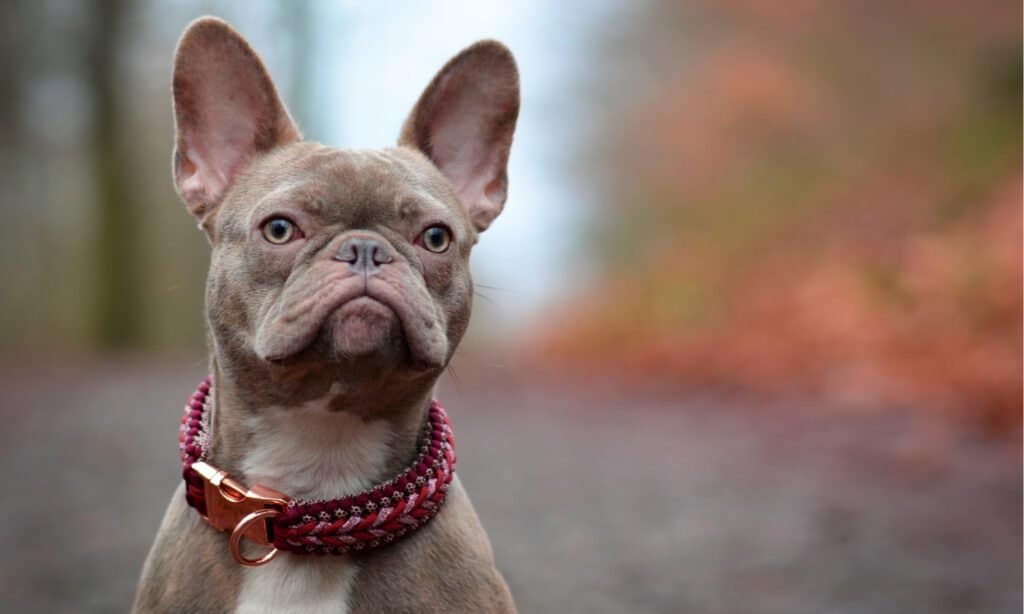
Most French bulldogs can begin obedience training from the time they are eight weeks old.
©Firn/Shutterstock.com
If you have just welcomed a lovable French bulldog into your family, then you may be wondering when you should start obedience training. Your Frenchie may be a kind natured and happy pup, but she will still require basic obedience training to help her become a well-rounded member of your family.
Most French bulldog puppies are receptive to basic obedience training by the time they reach eight weeks of age, so most Frenchie parents can begin the training process from the moment of adoption. The French bulldog is known for being very smart but can also be a bit stubborn. This breed does best when their training is positive and encouraging, but it should also be very consistent to combat their stubborn behavior. The French bulldog is also food driven, so this can be a wonderful tool to keep in mind throughout the process!
What Commands Should I Teach My Frenchie First?
I’s time to list some of the commands we think all Frenchies should learn first. While you can certainly branch away from this list and teach your French bulldog some more advanced commands, these are the basics we think you should start with:
- Sit
- Stay
- Lay Down
- Come
- Drop it
You should also socialize your Frenchie while you are teaching her basic obedience. Though French bulldogs are known for being generally friendly, they can still struggle with excessive barking and fear if they are not properly socialized. We highly suggest introducing your French bulldog to new people, new animals, new settings, and even new sounds.
Just be sure to only introduce her to unvaccinated or unfamiliar dogs once she is fully vaccinated, as doing this any earlier can put her at risk of catching infectious diseases. For example, we do not suggest taking her to a dog park until she is fully vaccinated against parvovirus, canine distemper, and rabies.
When Should My French Bulldog Be House Broken?
As we mentioned above, the French bulldog breed is typically very smart. This means that while they can be a bit stubborn at times, they typically catch on to new commands fairly quickly. This includes potty training!
When you are consistent and firm with your housebreaking process, most French bulldogs catch on within a few months of the training being implemented. If you are potty training a French bulldog pup, then you can typically expect him to be fully potty trained within three to five months of housebreaking being implemented. Just be sure to be patient throughout the process, as French bulldogs only respond to positive and uplifting training methods.
When Should My French Bulldog Be Spayed or Neutered?
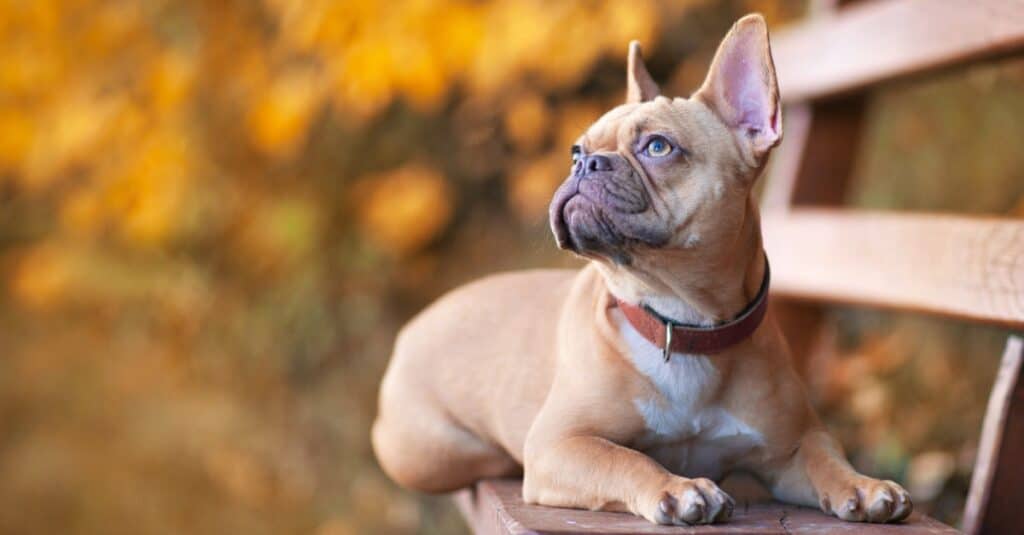
Most vets will agree that spaying or neutering your Frenchie between six months to one year of age is ideal.
©iStock.com/Firn
You may be wondering when it is the best time to have your babe spayed or neutered. Sterilizing your French bulldog can offer her a variety of benefits, ranging from preventing unwanted litters to cutting down her risk of developing reproductive cancer or infections.
It is common to find conflicting advice on when it is the best time to spay or neuter your French bulldog, but most veterinary professionals agree that the best timeframe is between the age of six months to one year. This appears to be a good age range to avoid any growth complications from being desexed too early, while also being performed early enough to cut down on reproductive infections and cancers down the line.
Common Health Issues Seen In French Bulldogs
Most French bulldogs will live a long and happy of anywhere from 12-15 years, but there are some health complications they may experience. Not all of these health complications can be prevented but catching them and managing them early on can offer your pup the best chance at living a full life.
Breathing complications: The French bulldog has a shortened nose and elongated soft palate that makes them likely to experience brachycephalic airway syndrome. This means that their airways can often be obstructed, often leading to breathing difficulties. Frenchies are more at risk of struggling with exercise intolerance, difficulty cooling down, and heat stroke.
Hip dysplasia: This is irregular formation of hip joints. Hip dysplasia causes the hip joint to have more laxity than it should, often causing the hip joint to rub and grind. Not only is this very painful as it progresses, but it can cause serious deterioration of the hip joint over time. The most common signs of hip dysplasia include limping, stiff joints, difficulty getting up and down from a seated or lying position, avoiding exercise, muscle wasting in the back end, and leg sensitivity.
Allergies: French bulldogs are highly prone to developing allergies, especially those that impact their skin. This occurs when they are allergic to anything in the world around them, ranging from plant pollen to fragrances in your house. Common allergy symptoms in French bulldogs include skin redness, itching, chewing or licking the paws, sores on the skin, excessive shedding, watery eyes, sneezing, and GI upset.
Birthing complications: Many French bulldogs are unable to birth their puppies naturally due to the shape of their hips. For this reason, if you are planning to breed your French bulldog, then we highly suggest establishing a relationship with a veterinarian that can perform a C-section.
Pictures of French Bulldogs as Puppies

Can you imagine being the parent of not one, but four adorable French bulldog puppies!?
©iStock.com/Celiaaa
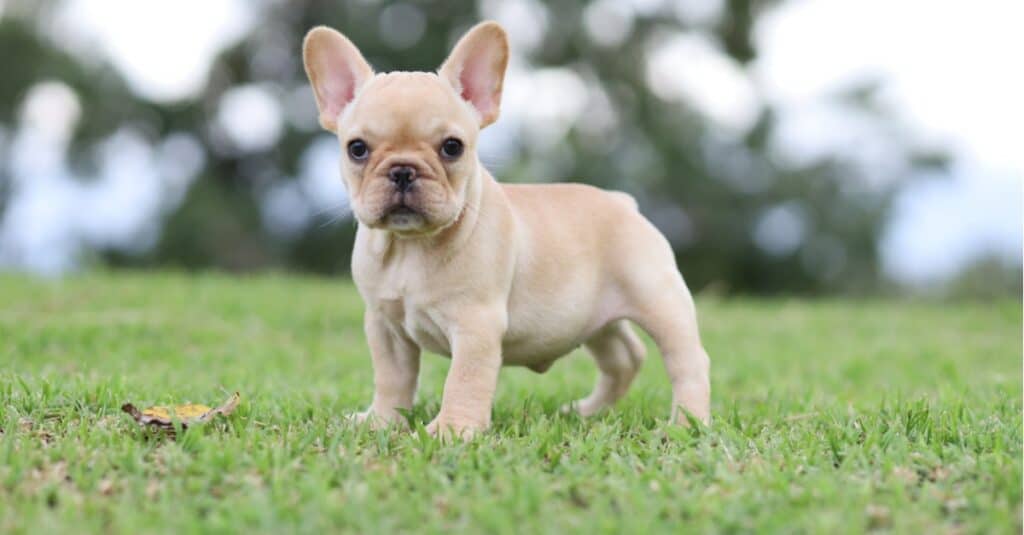
A tiny French bulldog puppy will need to be potty trained.
©iStock.com/goo.gl/73nyq6

A French bulldog puppy makes an adorable holiday gift (as long as owners are prepared to care for the pup).
©iStock.com/Firn
Pictures of French Bulldogs at 6 Months
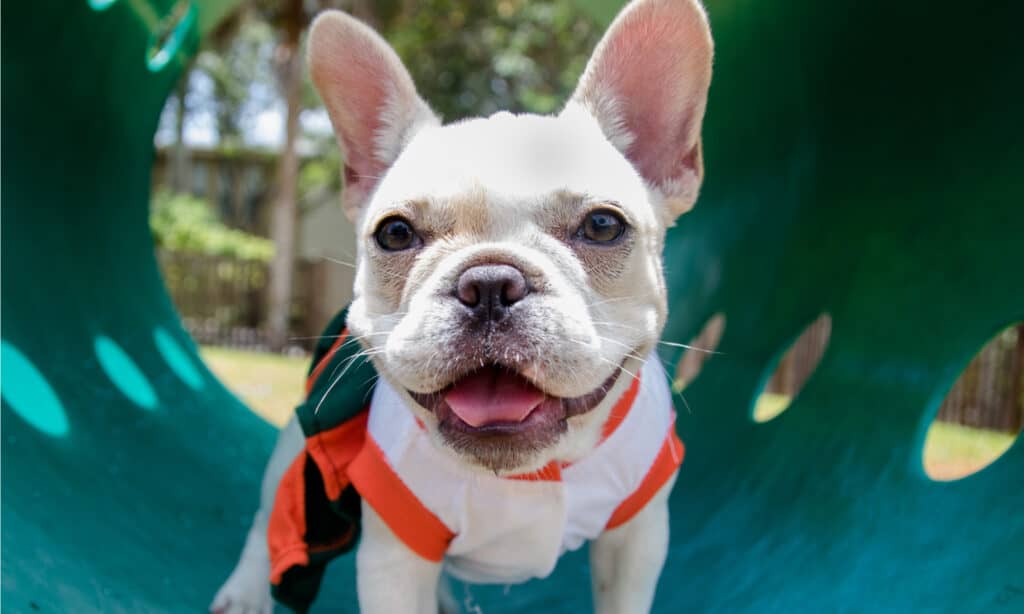
French bulldogs enjoy going to the dog park.
©RyanTaylor/Shutterstock.com
Pictures of Fully Grown French Bulldogs
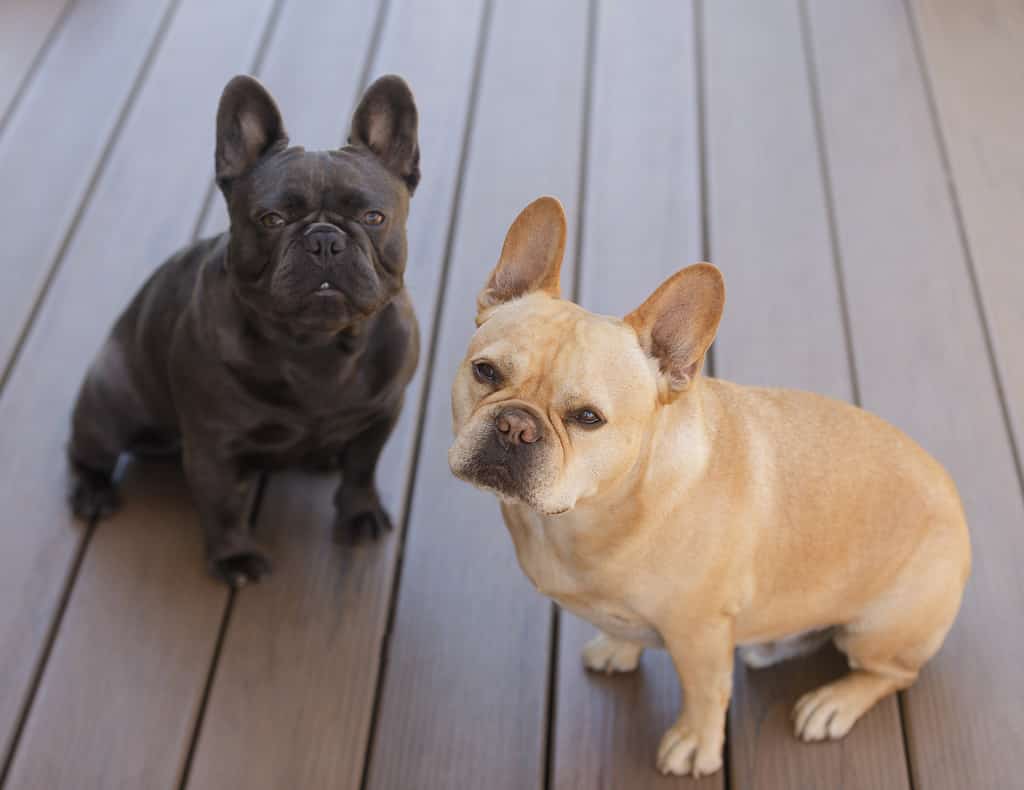
The only thing better than one French bulldog…..is two!
©iStock.com/yhelfman

This beautiful French bulldog is the perfect couch companion!
©Lined Photo/Shutterstock.com
Is the French bulldog the perfect pup for your family? Be sure to review the information we discussed above, and you can have the tools needed to be the best French bulldog parent possible!
The photo featured at the top of this post is © Angyalosi Beata/Shutterstock.com
Ready to discover the top 10 cutest dog breeds in the entire world?
How about the fastest dogs, the largest dogs and those that are -- quite frankly -- just the kindest dogs on the planet? Each day, AZ Animals sends out lists just like this to our thousands of email subscribers. And the best part? It's FREE. Join today by entering your email below.
Thank you for reading! Have some feedback for us? Contact the AZ Animals editorial team.






